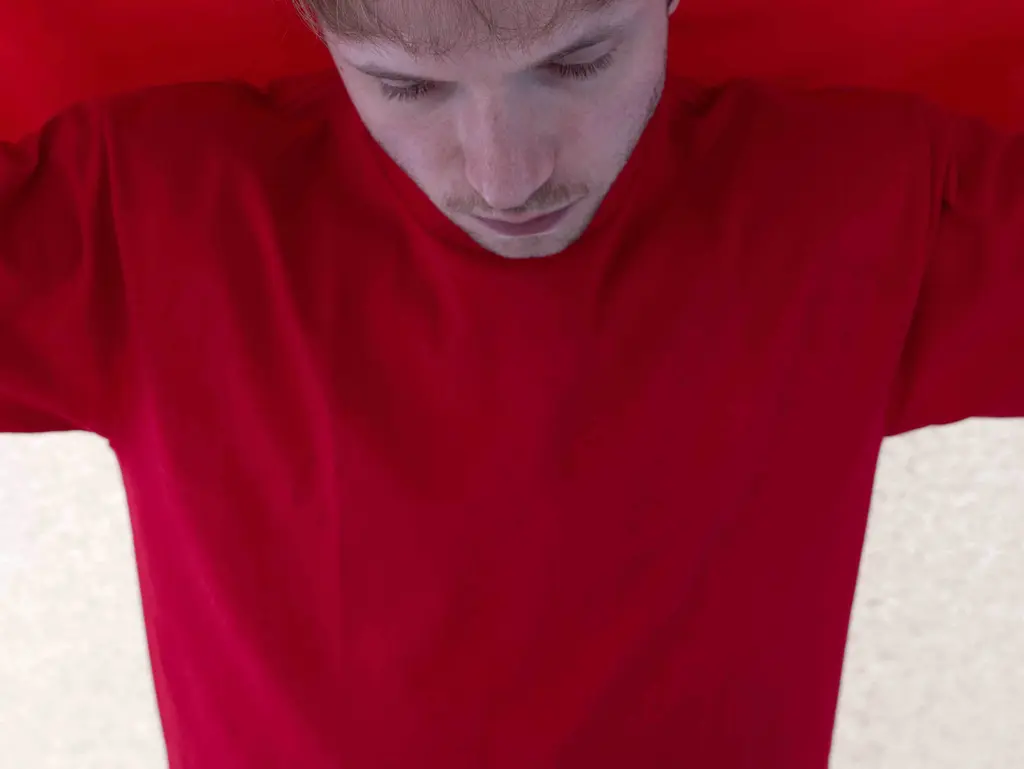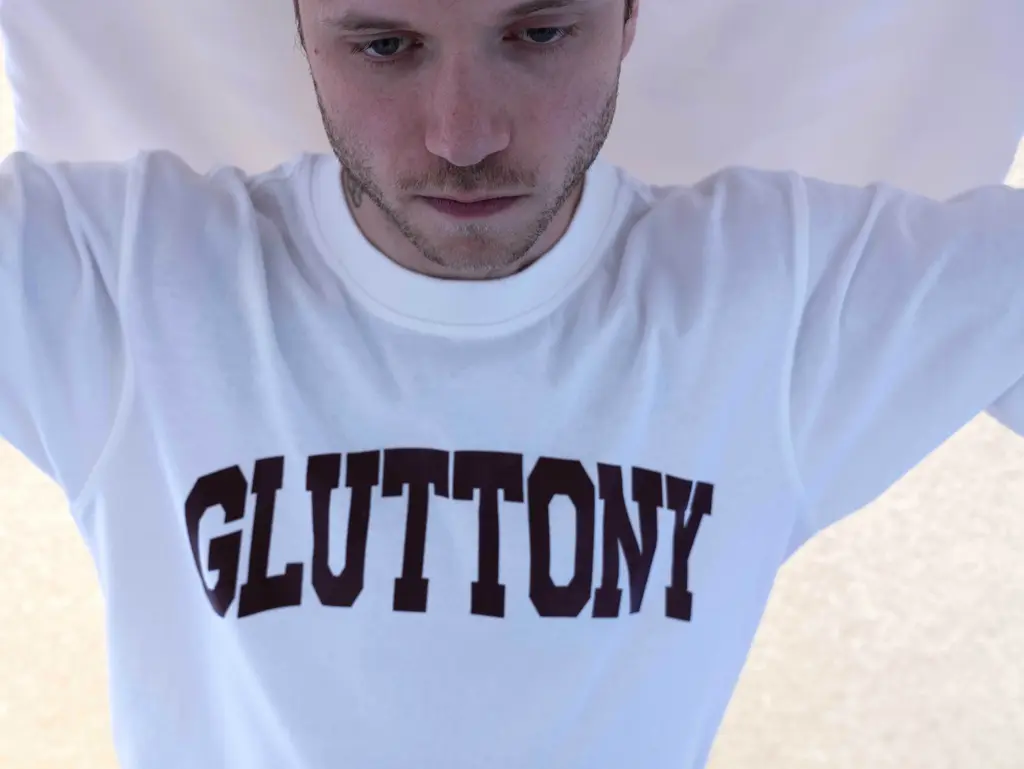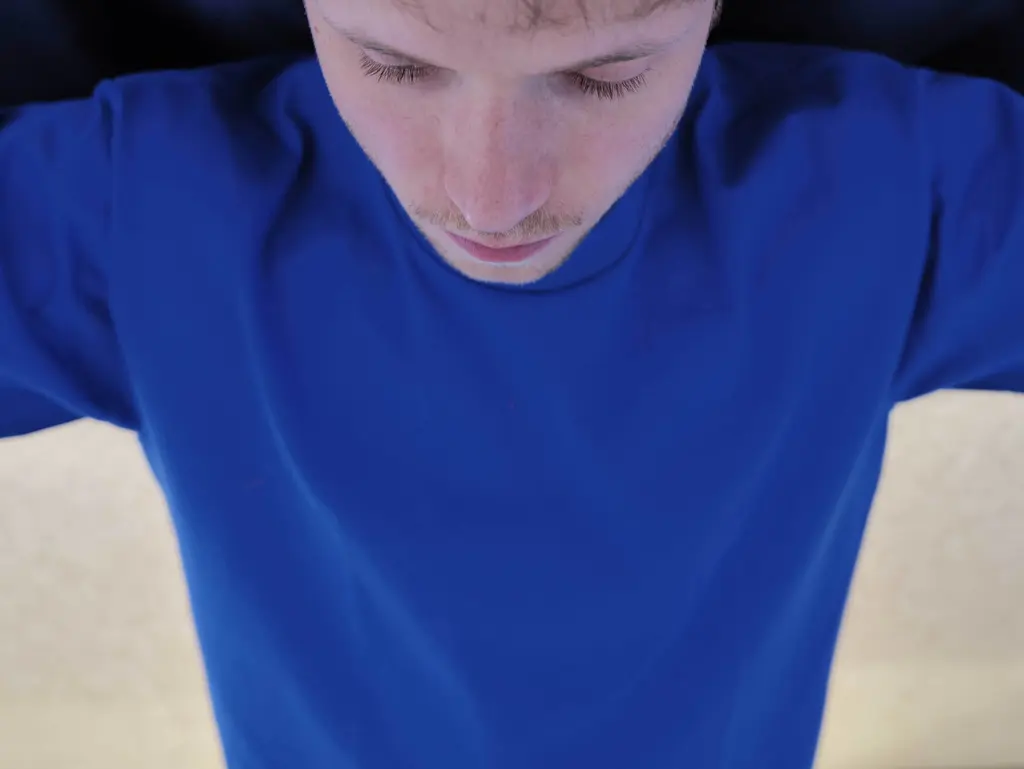Corbin can see the light

The underground musician formerly known as Spooky Black has battled addiction and endured an uncomfortable relationship with viral fame. With his former alias distant in the rearview mirror, he’s now fumbling for glimmers of hope on his new album, Crisis Kid.
Music
Words: Emma Madden
Photography: Hendrik Schneider
Corbin is watching a building burn down, from the window of his record label’s LA office. While his manager and I freak out, the cult musician says nothing. Dressed in loose earth tones – faded Billabong shirt, distressed khakis and well-worn Docs— he takes out his phone to snap a single photo, pressing the capture button just as the smoke turns a charcoal shade of grey. When a fire engine is promptly dispatched, he sits back down on the office sofa, pulls out his third Camel Turkish Royal in 20 minutes, and lights one up with the sky.
The 27-year-old artist born Corbin Smidzik, and formerly known as Spooky Black, reveals little with his minimal facial expressions. When Corbin speaks, he often looks down at his shoes, tugging at his socks. But as he relaxes into our interview – his first in seven years – it becomes clear he registers everything with keen sensitivity. As he opens up about his faith and his struggles with addiction, he looks directly at me with gentle eyes.
It’s been 11 years since Corbin broke through as the melancholic lothario Spooky Black. The video for his alt R&B ballad, Without You, depicted the then 15-year-old wearing a black durag and turtle neck with a thick chain, trudging through a snowy forest in his native Minnesota. Later in the viral clip, he’s lounging on a couch, wearing the same ensemble but in all white. The video quickly surpassed a million views, becoming the digital curio of its day, and it secured a prominent place in the canon of niche internet ephemera. It’s now sitting on 13 million YouTube views.
“I try not to think about my music from the past,” Corbin says, now rocking a choir boy haircut and stubble. “But when I do look, it’s like it’s a different person.”



Without You was a paragon of the early SoundCloud era, an exciting time when teenagers from niche corners of the internet had begun to bypass traditional industry gatekeepers, reaching millions of listeners without compromising their sound or style. Music became post-geographical, with elements of genres being more commonly adopted outside of their traditional context. As people raised eyebrows to Yung Lean emerging from Sweden with an Atlanta-inspired rap sound, Corbin’s success stirred debate about the distinction between homage and appropriation when white artists experiment with R&B. This discourse only fuelled the virality.
Today, Corbin admits he had a “troll-like mindset” when he dropped Without You. “[I wanted to create] a funny juxtaposition: a dumb video with really sad content,” he explains. He quickly moved on from the dumb stuff, dropping the Spooky Black moniker just a few months after Without You was released in 2014, but stuck with the sadness. From his breakthrough EP Leaving that year to the apocalyptic love story of his 2017 debut album Mourn through to 2021’s emotionally tumultuous Ghost With Skin, Corbin’s music spoke to a deep sense of generational despair.
“I feel myself returning to my shell a bit. I’m trying to force myself not to go all the way back in”

He clearly had no appetite for fame. When Kylie Jenner misquoted a Without You lyric in an Instagram caption in 2014, Corbin tweeted: “i don’t give a fuck about your fame” and “you’re worthless like the rest of us”. He claims his only regret about his breakthrough era is that he didn’t try to collaborate with late emo rap stars Lil Peep and Juice WRLD.
Between 2021 – 2025, there was little musical output from Corbin. Then, in January this year, he released Without You on major streaming services for the first time, largely as a warm up for his new album Crisis Kid, which drops 3rd April. “I want to promote this thing instead of just dropping and disappearing, which I did in the past,” he says.
Crisis Kid is largely a product of Corbin’s sobriety. The album is, for all intents and purposes, guitar music, its dour and brooding melodies reminiscent of New Order and Drab Majesty. He makes a focused attempt to unblur his words, to make them deliberate, concise and clear. Although it lets in a newfound sense of light, the album, like Corbin’s own life, doesn’t map onto a neat redemption arc. “No, it won’t heal every scar /But it’s a start,” he sings on the jangly new wave song Come Down, while on the tender track Crow, he reveals that he’s “tired of fetishising pain.”
“I naturally write about sadness,” Corbin says. “I know people can relate to sadness – that’s why my older music resonated. But with this record especially, I’m trying to make a pivot, for myself and for others, to make music that heals.” This, for Corbin, is easier said than done.
“My parents are perfect. They’ve stood by me through sobriety and the whole 12 years of me doing this music thing”
He’s been sober since New Year’s Day 2023, a decision prompted by a pair of soiled khakis at an airport. “I was with my parents in Florida, about to fly home, and I thought, ‘Let me just get a couple more drinks in,’” he remembers. “I drank, like, six gin and tonics. Went to use the restroom before getting on the plane and ended up missing the urinal. I pissed all over my pants in public, at the airport… I thought, ‘OK, I can stop now.’”
Corbin had been seriously drinking since around the time Without You went viral. “I did it to kind of ignore the pressures that came with internet popularity, or whatever you want to call it,” he says. He began retreating from the world further and drinking harder when he was hacked around a year later, at the age of 16. “Some guy said to shout him out or else he’d take all my stuff,” he recalls. When Corbin didn’t respond, the next day the hacker broke into all of his social media accounts and forwarded all of Corbin’s outgoing calls and messages to himself. “That kid definitely beat down any sense of morale I had as far as online presence goes. I really hit it hard between then and [the age of] 23,” Corbin says.
“I ruined a lot of relationships, burned a lot of bridges, and generally terrorised my friends.” He turned to substances, too, “so I could become a synthetic version of myself, like a braver, fake version.” Addiction, he says, runs in his family. One of his mothers (Corbin was conceived via sperm donation), who is also Corbin’s business manager, is fifteen years sober. “My parents are perfect,” he says. “They’ve stood by me through sobriety and the whole, like, 12 years of doing this music thing.”
His mothers raised him in the Unitarian Universalist Church, a pluralist religion that covers a broad range of ideas and doctrines. As was common practice in the Church, at fifteen he was instructed to write a credo, or everything he believed. Corbin simply wrote: “Nothing.” Now, “nothing” is less a passive stance for Corbin and more a belief system in its own right. “I don’t think we’re supposed to have a finger on the unknown; we’re only given tiny glimpses,” he says. He found a Unitarian Universalist Church here in Los Angeles a couple of weeks ago, where he prays to nothing in particular. He goes simply for the practice of being among strangers, fumbling for community. “I do wish there were more resources for secular sober people,” he says, “but if I feel I’m going to relapse, I’ll go to AA.”

So far, Corbin has only relapsed on alcohol once, while living in a windowless guest suite at The W Hotel in Beverly Hills. He felt abdominal pains from the high enzyme levels in his liver, his digestion was messed up and his ankles were swollen. There was no part of him that could go on drinking. “I had to take a look at the world for the first time since I became an adult, to actually look at it and not cower away in fear.” He began writing Crisis Kid shortly after the relapse.
These days, Corbin goes to bed before midnight. He drinks a smoothie a day, a blend of ginger, turmeric, spinach and berries and for the past four years, he’s been strictly vegan. “I’ve relapsed on cheese a couple of times,” he admits, shrugging. “But, whatever. Eating a cheese pizza is better than drinking liquor.”
Later this month, Corbin hits the road for his Clown on Stage tour, named after a song from Crisis Kid. The North American dates sold out in seconds, and now rehearsals are at the forefront of his mind. “I feel myself returning to my shell a bit,” he admits. “I’m trying to force myself not to go all the way back in.”
At least until the tour is over, Corbin knows he’s accountable to his family, his label, his publicist and his fans. This external pressure, he says, is needed. “I probably would have cowered if I were alone, or if I didn’t have receipts that are now in song form,” he says, smoking his last Camel right down to the nub. “I need to do this thing that doesn’t necessarily feel natural. This is how I grow, I think.” The fire’s been put out, though the sky’s still burning.




